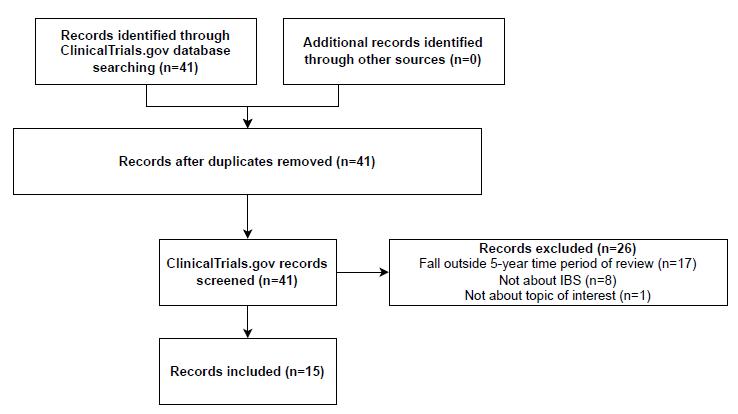Patient-reported outcome measures used in interventional studies of irritable bowel syndrome: a targeted review
Jack Lawrence, Emily Boxell Vitaccess, London, UK
Background & Objectives
Irritable bowel syndrome (IBS) is a chronic and debilitating functional gastrointestinal disorder that affects 10-15% of the global population1 It presents as a change in the frequency or form of usual bowel habits in conjunction with abdominal pain, and is co-morbid with symptoms of depression and anxiety in 29% and 39% of patients, respectively2 IBS is a complex syndrome that has not been reliably linked to physiological indicators, thus a biological marker of IBS has not yet been established. Patient-reported outcome measures (PROMs) remain the only measure that can be used to assess the treatment effectiveness of interventions and clinical trials3 . This review aimed to identify and categorise the interventions and PROMs used in studies developing therapies for the management of IBS
Methods
A targeted search of ClinicalTrials gov was conducted to collate studies assessing the efficacy of interventions for the management of IBS in the last 5 years Observational studies were excluded Data concerning the studies’ designs, eligibility criteria, intervention type and PROMs were extracted and reviewed (see Figure 1)

Results
15 studies were included in this review, of which 93% assessed nonpharmacological interventions Interventions primarily comprised of behavioural therapy, a dietary change, or probiotic supplements (each 27%) The remaining 3 interventions consisted of a faecal transplant study, a mindfulness course, and a pharmacological treatment The most frequently used PROM was the IBS symptom severity scale (IBSSSS)4 , which featured in 87% of studies The next most frequently implemented was the IBS-QoL5 , which was utilised in 67% of studies 10 interventions focussed on treating the physiological symptoms of IBS (dietary, faecal transplant, probiotic, or pharmaceutical), of which 90% utilised the IBS-SSS and 50% employed the IBS-QoL In therapeutic interventions which sought to address the mental health comorbidities of IBS (n=5), there was no disparity between the frequency of including the IBS-SSS and IBS-QoL as PROMs (80% for both measures) As shown in Figure 2
Discussion & Conclusions
The results produced by this review clearly show a preference for the use of the IBS-SSS PROM to capture the disease impact of IBS, as this was the outcome measure used most frequently to collect symptom severity and quality-of-life (QoL) data, followed by the IBS-QoL.
The IBS-SSS uses a timeframe of 10 days, and consists of nine items, of which only one addresses the respondent’s QoL, asking them to indicate how much IBS has interfered with their life in the previous 10 days Unlike the IBS-SSS, the IBS-QoL was designed to focus solely on the respondent’s QoL, and its 34 items are spread across eight subscales (dysphoria, interference with activity, body image, health worry, food avoidance, social reaction, sexual, relationships)
From the results of this review, only half of the interventions focussed on treating the physiological symptoms of IBS (abdominal pain, nausea, diarrhoea and/or constipation) included the IBS-QoL. While the IBS-QoL does not directly measure improvements in these symptoms, if an intervention is seeking to capture treatment effectiveness and improvements in patient outcomes, it could be beneficial to use a QoL instrument to capture the impact of changes in symptoms on aspects of importance to patients’ lives Recent research has demonstrated that improved QoL, both physiologically and psychologically, is independently associated with higher general satisfaction in life, but not gastrointestinal symptom severity6 This, in conjunction with the wide range of intervention types covered across a relatively small sample, demonstrates the importance of selecting a combination of PROMs which seek to capture the psychological and physiological burden of IBS, and improvements thereof
A strength of this review is its inclusion of interventions from several distinct therapeutic disciplines, encompassing behavioural therapies, faecal transplants, pharmacological treatments, dietary supplements, and mindfulness techniques combined with technology. This demonstrates the complexity of IBS as a syndrome existing at the confluence of physiological and psychological symptoms which the interventions identified in this review seek to remedy
A limitation of this targeted review is its dependence on a single database for the literature search Future iterations could consider including additional databases such as PubMed and Google Scholar to expand the scope of the search and gather further evidence to inform the review's conclusions This would also increase the number of eligible studies included in the review, thereby adding to the rigour of the research
The findings from this review indicate that the IBS-SSS is firmly established as a tool for use in interventional studies targeting the physiological symptoms of IBS Furthermore, the selection of PROMs for therapeutic interventions underscores the importance of gaining a comprehensive understanding of participants’ experiences with IBS
References
1. Zhang T, Ma X, Tian W, et al. Global Research Trends in Irritable Bowel Syndrome: A Bibliometric and Visualized Study. Frontiers in Medicine. 2022;9. doi:10.3389/fmed.2022.922063.
2. Staudacher HM, Black CJ, Teasdale SB, Mikocka-Walus A, Keefer L. Irritable bowel syndrome and mental health comorbidity approach to multidisciplinary management. Nature Reviews Gastroenterology & Hepatology. 2023;20(9):582-596. doi:10.1038/s41575-023-00794-z.
3. U.S. Department of Health and Human Services Food and Drug Administration Center for Drug Evaluation and Research (CDER) Guidance for Industry: Irritable Bowel Syndrome - Clinical Evaluation of Drugs for Treatment. 2012. Available at: www.fda.gov/downloads/Drugs/Guidances/UCM205269.pdf
4. Francis CY, Morris J, Whorwell PJ. The irritable bowel severity scoring system: a simple method of monitoring irritable bowel syndrome and its progress. Alimentary Pharmacological Therapeutics 1997;11:395–402.
5. Patrick D, Drossman D, Frederick I, Dicesare J, Puder K. Quality of life in persons with irritable bowel syndrome: development and validation of a new measure. Digestive Diseases & Sciences 1998;11:400–411. doi: 10.1023/A:1018831127942.
6. Snijkers JTW, Winkens B, Weerts ZZRM, et al. Satisfaction with Life in IBS Is Associated with Psychological Burden Rather than Gastrointestinal Symptom Severity. The American Journal of Gastroenterology. 2023;119(3):512-520. doi:10.14309/ajg.0000000000002547.


